
 The lion’s share of stores that Kroger is selling to C&S as part of its merger with Albertsons are in Washington state (124), Arizona (101) and Colorado (91), according to a list released by Kroger that identifies the affected stores. In all, Kroger is divesting 579 Kroger and Albertsons stores in 18 states and the District of Columbia.
The lion’s share of stores that Kroger is selling to C&S as part of its merger with Albertsons are in Washington state (124), Arizona (101) and Colorado (91), according to a list released by Kroger that identifies the affected stores. In all, Kroger is divesting 579 Kroger and Albertsons stores in 18 states and the District of Columbia.
Six distribution centers in Arizona (2), Colorado (2), Utah (1) and Washington state (1) are also being sold to C&S as well as one Colorado dairy plant.
The Kroger Co. and Albertsons Companies Inc. announced in April that they amended their definitive agreement with C&S Wholesale Grocers for the sale of assets in connection with their proposed merger announced on Oct. 14, 2022. This amended package modifies and builds on the initial divestiture package that was announced on Sept. 8.
The amended divestiture package responds to concerns raised by federal and state antitrust regulators regarding the original agreement. The enhanced divestiture package includes a modified and expanded store set and additional non-store assets to further enable C&S to operate competitively following the completion of the proposed merger. The companies believe the amended divestiture package will bolster their position in regulatory challenges to the proposed merger, including pending court proceedings.
“We have reached an agreement with C&S for an updated divestiture package that maintains Kroger’s commitments to customers, associates and communities, addresses concerns raised by regulators, and will further ensure that C&S can successfully operate the divested stores as they are operated today,” Rodney McMullen, Kroger’s chairman and CEO said in April. “Importantly, the updated divestiture plan continues to ensure no stores will close as a result of the merger and that all frontline associates will remain employed, all existing collective bargaining agreements will continue, and associates will continue to receive industry-leading health care and pension benefits alongside bargained-for wages.
“Our proposed merger with Albertsons will bring lower prices and more choices to more customers and secure the long-term future of unionized grocery jobs.”
The proposed merger will create meaningful and measurable benefits for America’s consumers, Kroger and Albertsons Cos. associates, and communities that both Kroger and Albertsons Cos. serve by expanding access to fresh, affordable food and establishing a more compelling alternative to large, non-union retailers. This updated divestiture plan marks another next step toward the completion of the merger by adding a well-capitalized competitor into new geographies.
“We are confident this expanded divestiture package will provide the stores, supporting assets and expert operators needed to ensure these stores continue to successfully serve their communities for many generations to come,” Eric Winn, CEO of C&S said in April. “C&S is a leader in the grocery industry, and we are excited for this expansion of our current retail business, which is a key part of our long-term growth strategy. We look forward to welcoming storied banners, quality private label brands, and a team of experienced retail associates into the C&S family.
“This amended agreement enables C&S’s heritage of selection, value and customer service to continue our legacy of ‘braggingly happy customers’.”
The updated divestiture package increases the total store count by 166 to include 579 stores that will be sold to, and continue operating as they do today by the new owner, C&S.
It maintains the sale to C&S of the QFC, Mariano’s and Carrs banner names. Under the amended agreement, Kroger will also sell the Haggen banner to C&S. Stores currently under these banners that are retained by Kroger will be re-bannered into one of the retained Kroger or Albertsons Cos. banners following the close of the transaction with C&S.
Under the amended agreement, C&S will license the Albertsons banner in California and Wyoming and the Safeway banner in Arizona and Colorado. In these states, Kroger will re-banner the retained Albertsons and Safeway bannered stores following the closing of the merger. Kroger will maintain the Albertsons and Safeway banners in the remaining states.
The number of stores contained in the divestiture plan by geography is as follows:
- WA: 124 Albertsons Cos. and Kroger stores
- CA: 63 Albertsons Cos. stores
- CO: 91 Albertsons Cos. stores
- OR: 62 Albertsons Cos. and Kroger stores
- TX/LA: 30 Albertsons Cos. stores
- AZ: 101 Albertsons Cos. stores
- NV: 16 Albertsons Cos. stores
- IL: 35 Albertsons Cos. and Kroger stores
- AK: 18 Albertsons Cos. stores
- ID: 10 Albertsons Cos. stores
- NM: 9 Albertsons Cos. stores
- MT/UT/WY: 11 Albertsons Cos. stores
- DC/MD/VA/DE: 9 Harris Teeter stores
The above stores (regardless of banner) will be sold by Kroger to C&S following the closing of the merger with Albertsons Cos.
In connection with the additional stores being conveyed to C&S, the updated divestiture package includes increased distribution capacity through a combination of different and larger facilities as well as expanded transition services agreements to support C&S and the addition of one dairy facility.
The amended divestiture package also expands the corporate and office infrastructure provided to C&S given the increased store set to ensure C&S can continue to operate the divested stores competitively and cohesively. All fuel centers and pharmacies associated with the divested stores will remain with the stores and continue to operate.
The amended agreement maintains the divestiture of private label brands Debi Lilly Design, Primo Taglio, Open Nature, ReadyMeals and Waterfront Bistro to C&S. The revised agreement also provides C&S with access to the Signature and O Organics private label brands.
The updated plan will:
- Extend a competitor to new geographies through the sale of stores to a well-capitalized buyer that is led by seasoned operators with a strong balance sheet and a sound business plan;
- Ensure that no stores will close as a result of the merger;
- Maintain all current collective bargaining agreements, which include industry-leading healthcare and pension benefits, bargained-for wages, and ensuring frontline associates remain employed; and
- Commit to invest in associates and stores for the long term.
Subject to fulfillment of customary closing conditions, including Federal Trade Commission and/or other governmental clearance, and the completion of the Kroger-Albertsons merger, C&S will pay Kroger an all-cash consideration of approximately $2.9 billion, including customary adjustments.
The proposed merger with Albertsons Cos. will produce meaningful and measurable benefits for customers, associates and communities across the country. The combined company committed that no stores, distribution centers or manufacturing facilities will close as a result of the merger.
Customers will benefit from lower prices and more choices following the merger close. Kroger committed to investing $500 million to begin lowering prices day one post-close, and an additional $1.3 billion to improve Albertsons Cos.’ stores.
This commitment builds on Kroger’s long track record of reducing prices every year, with $5 billion invested to lower prices since 2003. Customers will also have access to more favorite items from their own communities, as Kroger committed to increasing the number of local products in its stores by 10 percent post-close. This merger creates more opportunities for families to access the fresh, affordable foods they love.
As a combined company, Kroger committed to investing $1 billion to raise wages and comprehensive benefits. This builds on the incremental $2.4 billion Kroger invested to improve wages and comprehensive benefits since 2018. To provide the best holistic support for each associate, the company will also extend continuing education and financial literacy benefits to all associates following the merger close. As union membership continues to decline nationwide, especially in the grocery industry, this merger is the best way to secure union jobs. Kroger has added more than 100,000 good-paying union jobs since 2012.
The proposed merger will allow the combined company to invest more deeply to end hunger in communities across America. In 2023, Kroger committed to donating 10 billion meals to families across the U.S. by 2030. Bringing these companies together provides one more step toward achieving communities that are free from hunger and food waste.
Kroger and Albertsons Cos. remain committed to defending the merger in court and unlocking the many benefits it offers.
For more news of interest to the grocery industry, subscribe to Gourmet News.







